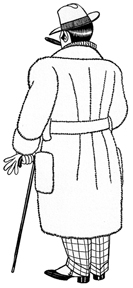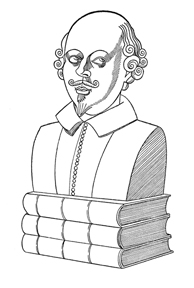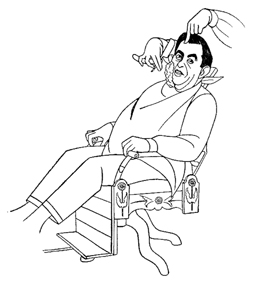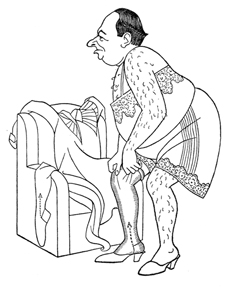Here are 10 things you should know about Martha Scott, born 109 years ago today. In 50-year career, she enjoyed success in pictures, television and on Broadway.
Tag: Jed Harris
Times Square Tintypes: The Broadwayite
In this chapter from his 1932 book, Times Square Tintypes, Broadway columnist Sidney Skolsky profiles a character he dubs The Broadwayite.
FOUR OUT OF FIVE
OUT of the mess of broken hearts, out of the string of speakeasies, out of the stage door, out of the glare of the White Lights, there has taken form a strange being. He is the soul of Broadway. He speaks its lingo. He symbolizes its credo. One little block, east or west of Broadway, and he is in another universe. Step up and shake hands with THE BROADWAYITE.
 He considers it quite an honor if Madame Guinan bounces him over the head with a bottle.
He considers it quite an honor if Madame Guinan bounces him over the head with a bottle.After a two-minute acquaintanceship with anybody he calls the party by his first name.
His philosophy of life is merely a protective covering for his shortcomings. When he dies he still will be waiting for “the breaks.”
He reads Variety from cover to cover. Can tell you where they got that inside story. Also, if it’s true. Is certain his statement is the last word in the matter.
His manners are atrocious. He always keeps his hat on. Thinks it makes him look like a newspaper man.
He is a gag carrier.
Is a sidewalk critic. Stands on the curb during intermissions and gives lectures on the entertainment. Calls all the critics by their first names. He looks familiar to them.
When dining with anyone he orders filet mignon. And can outfumble anyone for the check. When eating alone he orders beans.
Remembers George White when he was only a hoofer. Recalls vividly how George followed his advice. Knows who really picks the girls for Ziegfeld. He informs everyone that Lillian Gish and George Jean Nathan really hold hands.
He talks loudly. Even when he whispers.
He has a repertoire of stories. Uses them again and again. Even employing the same gestures. He gets to be quite boring.
He is unfeeling. His proudest moment was when a chorine jumped from the ninth floor of a hotel because he jilted her. The newspapers spoiled it all by saying she fell.
Looks for his name in Ward Morehouse‘s recording of the celebrities present. Believes the list to be incomplete if his name is not included.
He thinks that dramatic criticism in this man’s town is a matter of personal prejudice and that the Paramount Building is actually at the “crossroads of the world.”
Had a sandwich named after him in a well-known delicatessen.
If given his choice to be anyone in all history he would select himself.
He has never been in the Metropolitan Opera House. Tried to crash it once. It was the Lambs’ Gambol. He couldn’t get by a ticket taker. He went in like a Lamb and came out like a lion.
Nothing has ever been known to embarrass him.
Will often reprimand a waiter in this manner: “How about a little service? Do you know who I am? I’m practically God.”
Let him cough once. Then he believes that the night life has got him at last. That he has tuberculosis. A lozenge clears the throat and he is off again.
His ambition in life is to have his nameplate on a seat in the Chanin theaters.
He has written for almost every magazine in America. Has the rejection slips to prove it.
His favorite expression is “I told you so.”
He is greatly admired by folks who don’t know him.
It is utterly impossible for him to keep a secret.
Times Square Tintypes: Kelcey Allen
In this chapter from his 1932 book, Times Square Tintypes, Broadway columnist Sidney Skolsky profiles drama critic Kelcey Allen.
BROADWAY’S WET NURSE
KELCEY ALLEN. He’s the dramatic critic of Women’s Wear, a he-man’s newspaper.
He was on Broadway when Jed Harris was a spindle-legged kid taking violin lessons in Newark. When Shanley’s was situated at the crossroads of the world and didn’t know it. When George White ran away from home to become a jockey. When the mob gathered at the Metropole bar. When Earl Carroll, a big boy for his age, walked the streets of Pittsburgh in a white sailor suit and “Throw ’em Down McCloskey” was the popular tune of the day. Today he’s grandfather to New York’s dramatic critics.
His first name is Eugene. But he doesn’t use it because he is a believer in numerology.
Started his theatrical career by carrying copy for the critics. In those yesteryears the critics wrote their reviews in the theater. He called for their copy, delivering it to their respective papers. He received twenty-five cents from each critic. He looked mighty cute riding about town on a bicycle.
Is happily married to a most charming lady.
He types with two fingers. And generally stubs them.
He is the best broadcasting station side of the Rocky Mountains.
He lives at the Hotel Chelsea but gets his mail at the Hermitage Hotel.
Writes his reviews on the second floor of the Fitzgerald Building. It takes him an hour and half to do so. Then takes the review home, places it under his pillow and sleeps on it. A messenger calls for his copy every morning at nine.
He suffers from new diseases only.
Has attended more than 5,000 first nights.
Knows more about Broadway than any man in the Garment Center than any man on Broadway.
His father was a school teacher. Had a degree in philology. Spoke nine languages.
He knows every restaurant in town that serves an eighty-cent table d’hôte dinner. Also knows their daily specials without looking at the menu.
Has a repertoire of stories. Tells them again and again. Employing the same gestures.
He’s the best audience he’s ever had.
Visited Europe last summer and was received by the Pope. His trip was ruined, however, on hearing that a producer had withdrawn his advertisement from Women’s Wear.
He notices legs but can’t carry a tune.
Carries a folding wallet which when spread out would cover the dance floor of a night club. It contains passes for everything in town, from the Aquarium to the Metropolitan Opera House. Also carries various patent medicines with him. No matter what ails you he’s got something that will cure you.
Tells things in detail. Then says: “Now what I mean to say is this—” And he starts all over again.
Smokes cigars and only offers them to people who don’t smoke.
Actually placed himself on every opening-night list. He published a sheet listing all the critics. Mailed it to the press agents for their convenience. He placed his name on the list. Before long he was complaining about the location of his seats.
He perspires freely about the neck. When attending a banquet (his favorite indoor and outdoor sport) he always career an extra collar with him.
Calls people by their wrong names. When corrected says: “I know it’s his wrong name, but I call him that.”
In Sardi’s he once made a flip crack about an Italian who had a mustache which extended fully six inches on both sides. The playboys of the Rialto got busy. They told Kelcey the man had overheard him and threatened him. For two days he stayed away—frightened. On his return he immediately sought out the man with the mustache and said: “That remark overheard wasn’t about you. I’m sorry if you think so and I want to apologize.” The Italian rose, stared at Kelcey and said: “Me no spik English.”
His hobby is collecting newspapers with typographical errors.
Times Square Tintypes: William Shakespeare
In this chapter from his 1932 book, Times Square Tintypes, Broadway columnist Sidney Skolsky profiles, with tongue planted firmly in cheek, playwright William Shakespeare.
THE BARD OF AVON
WILLIAM SHAKESPEARE.—Was born April 22, 1564, in a little house on Henley Street, Stratford-on-Avon. The stunning event occurred at precisely three minutes past eight. His dad was already at work, not interested.
 He was the third child. Since then he has written thirty-seven plays, five poems and one hundred and fifty-three sonnets. Since then people have advocated Birth Control.
He was the third child. Since then he has written thirty-seven plays, five poems and one hundred and fifty-three sonnets. Since then people have advocated Birth Control.Always wears Buster Brown collars, Windsor ties, knickers and silk stockings.
His favorite eating place is the Mermaid Tavern.
It’s claimed he steals his ideas. He doesn’t deny it. Believes there’s nothing new under the sun. Hopes that some day people will steal from him.
He is vain and conceited. His favorite topic is William Shakespeare. He can talk about him for hours.
He never uses the subway. Never listens to the radio. Never sends a telegram. Never telephones. He writes all his plays in longhand. He can’t operate a typewriter.
Kit Marlowe and Ben Jonson he considers the world’s greatest men. His happiest moment was when he became the godfather of Jonson’s son.
Started his theatrical career by holding horses outside the Globe Theatre. Later became an actor. Then wrote plays to make more money.
His favorite dish is olives.
He was a wild kid, up to all sorts of mischief. Often arrested for deer stealing. Left school at the age of thirteen. At the age of eighteen he had to marry Anne Hathaway. Six months later he became the father of an eight-pound baby, Susanna.
George Bernard Shaw thinks his stuff is piffle. He never heard of Shaw.
He talks with fluency in a high tenor voice. Has reddish hair, a pointed chin, a face that mirrors every change of emotion.
His main weakness is that he is overfond of sleep. No matter what time of day it is, or where he is, he can fall asleep at a moment’s notice. He has never spent a sleepless night. Sleeps at least fourteen hours every day.
Rewrites all his stuff at least three times. Once rumored that Samuel Shipman was “ghost writing” his plays. This was discarded when critics proved that Shipman couldn’t write that bad no matter how hard he tried.
He dislikes bacon.
Is gentle, gay and witty. His wisecracks generally get him into trouble. Because of one of his flippant remarks he can’t break into the movies. He said: “All the World’s a Stage.”
He can’t carry his liquor. Two glasses of ale has him hugging the floor.
He refuses to allow Jed Harris to produce his play Hamlet because he doesn’t want George Abbott to rewrite it.
He hobnobs with actors, stagehands and producers. Yet he is on intimate terms with Lord Pembroke, the Earl of Essex, the Earl of Southampton and the Prince of Wales.
He has made his will. In it he states that to his wife he leaves his second best bed.
His right ear is a little larger than his left. Says this is so because he sleeps on his right side.
His ambition is to write a play which the Theatre Guild will produce.
Times Square Tintypes: John Golden
In this chapter from his 1932 book, Times Square Tintypes, Broadway columnist Sidney Skolsky profiles theatrical producer John Golden.
“PURE AS THE DRIVEN SNOW”
JOHN GOLDEN. He’s the only man who produces clean sex plays. Yet he always manages to give the public what it wants. A shrewd showman, he realizes the value of publicity. Started the “clean” gag because of its healthy box office appeal. It has “it.”
 Was once a bricklayer and the vice president of a chemical company. From the experience gained at the latter he is proficient in making gin.
Was once a bricklayer and the vice president of a chemical company. From the experience gained at the latter he is proficient in making gin.He wrote the song “Poor Butterfly,” with Raymond Hubbell and Charles B. Dillingham. In fact, his managerial career started on a song. His royalty check for “Goodbye, Girls, I’m Through,” was $40,000. Gave it to Mrs. Golden for a present. She loaned it back to him to produce Turn to the Right.
His favorite actor is Muni Weisenfrend. He never says this without adding: “And Otto Kahn agrees with me.”
Is very much interested in what makes an audience go to a play. Once distributed a circular during the run of Pigs inquiring, “What made you attend this show?” Seventy per cent of the answers were variations of “Because a friend told me about it.”
As a bricklayer he helped build the Garrick Theatre.
For the last thirty years the annual Lambs’ Washing has been held on his estate at Bayside.
He was a partner of Cohan and Harris in the production of Hawthorne of the U. S. A. His task was to pal about with Douglas Fairbanks, seeing that the young acrobat didn’t hurdle over taxicabs and climb up buildings.
He is superstitious. Likes to have a numeral in the title of his plays. Remember: The 1st Year, 2 Girls Wanted, 3 Wise Fools, 4 Walls and 7th Heaven. Considers 27 his lucky number. In roulette and other numerical games of chance he will bet huge amount on it.
He organized the Producing Managers Association. This led to the famous actors’ strike.
The man he quotes most is Ring Lardner.
Is not fussy about clothing. Never goes to a store to purchase wearing apparel. If he needs another tie, shirt or suit, he merely telephones for it.
Thinks Atlantic City and Miami are the only vacation spots worth knowing.
He is one of the few producers who treat the theater as if it were a business. Is in his office by nine every morning and leaves at five. Is in bed every night at ten. He never attends the theater in the evenings. Goes only to matinées. Misses every opening night. Even his own.
Owns the original Old Kentucky Home, having bought the Stephen Foster homestead in Federal Hill to save it from being torn down.
He realizes the value of flattery. Gets the most out of people he is associated with by using it.
His favorite tryout town is Elmira, N. Y. Believes it to be lucky and opens all his shows there.
Was the first to cover the front of a theatre with an electric sign. Did it with 3 Wise Fools at the Criterion. Then the movies took up the idea . . . And how!
He hates the word “clean.” Refrains from using it in his conversations. When it slips out accidentally, he looks embarrassed.
He has collaborated on songs with Irving Berlin, Douglas Fairbanks, Oscar Hammerstein, Victor Herbert and Woodrow Wilson.
Always puts on his glasses when he talks on the telephone.
His hobby is collecting “the key to the city.” He has framed in his office keys to twenty-seven of the most important cities in the United States.
He hates dogs and cringes when he sees one.
Has a barber shop in his office, fully equipped. Every day at twelve a barber appears and shaves him. Every other week he takes a haircut.
His home in Bayside has eight bedrooms. He sleeps in a different room each night, according to his mood.

